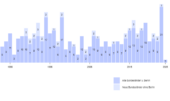The mention of Abolish Frontex and a “No Border Movement” in a Europol report was due to different interpretations of “terrorism”. They have now been removed from the current TE-SAT.
Europol has deleted the Abolish Frontex campaign and the international “No Border Movement” from its current EU situation report on terrorism. This was confirmed by the police agency at the request of “nd”. The changes had been requested from Europol by EU member states and an updated report was then published online by the agency on 26 October. The spokeswoman did not say which countries had requested the deletion.
Europol has been publishing the “EU Terrorism Situation and Trend Report” (TE-SAT) since 2017. It summarises terrorist incidents from the 27 member states. It also includes incidents of “violent extremism” from various political directions.
In the version of the “Trend Report” at the time, the anti-racist movements appeared under the heading “Left-wing and anarchist terrorist attacks, arrests, convictions and penalties” and the sub-heading “Activities and topics”. One of the reasons given was that the “No Border Movement” advocates the abolition of borders and worldwide freedom of movement “within the left-wing extremist and anarchist spectrum”. In this context, the EU border agency Frontex is also “seen as a stark enemy”.
In the original report, Europol also included a “No Border Camp” from August 2022 in Rotterdam among the networks that favoured “left-wing terrorism”. However, the Dutch police were not responsible for the deletion request, a spokeswoman told “nd”. But Europol had approached the authority with the question of whether the border camp could be delisted. They agreed “that this does not belong in the TE-SAT because it concerns activists and not extremists”. The Dutch police have also already made “adjustments and comments” to the first draft of the report, the spokesperson emphasised.
At the most recent meeting of Europol’s Parliamentary Scrutiny Board, Belgian Green MEP Saskia Bricmont asked Europol Director Catherine De Bolle about the methodology for the TE-SAT reports. De Bolle gave an evasive answer and referred to different interpretations of the 2017’s directive of “terrorism” in the member states, which are responsible for the national submissions for the annual EU report. According to De Bolle, there is also an Advisory Board to review the content of each edition.
This TE-SAT Advisory Board is made up of representatives of the past, present and future Presidencies of the Council of the EU, explains Europol to “nd”, along with permanent members. These are accordingly representatives from France and Spain, the EU Intelligence and Situation Centre (EU INTCEN), the EU Agency for Criminal Justice Cooperation (Eurojust), the office of the EU Counter Terrorism Coordinator (EU CTC), and Europol. The EU Commission acts as an “observer”. But it still remains unclear, if this TE-SAT Advisory Board was responsible for the mention of the NoBorder initiatives in the report – or for their deletion.
“Every year, the TE-SAT report proves how member states misuse the definition of terrorism and label activists as a threat to national security,” says Romain Lanneau from Statewatch on what he considers to be a unique process of a deletion. The British civil rights organisation is one of the initiators of a campaign to request personal information from Europol. Those presumably affected should ask the police agency what data is stored about them and report results back to the organisers.
Published in German in „nd“.
Image: KollektivOhne.





Leave a Reply